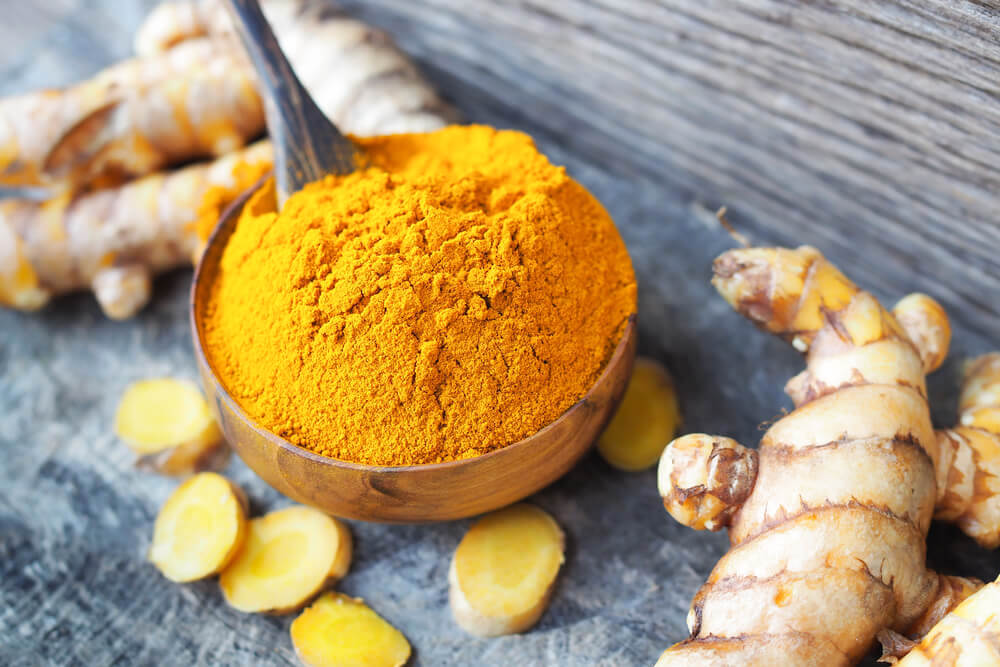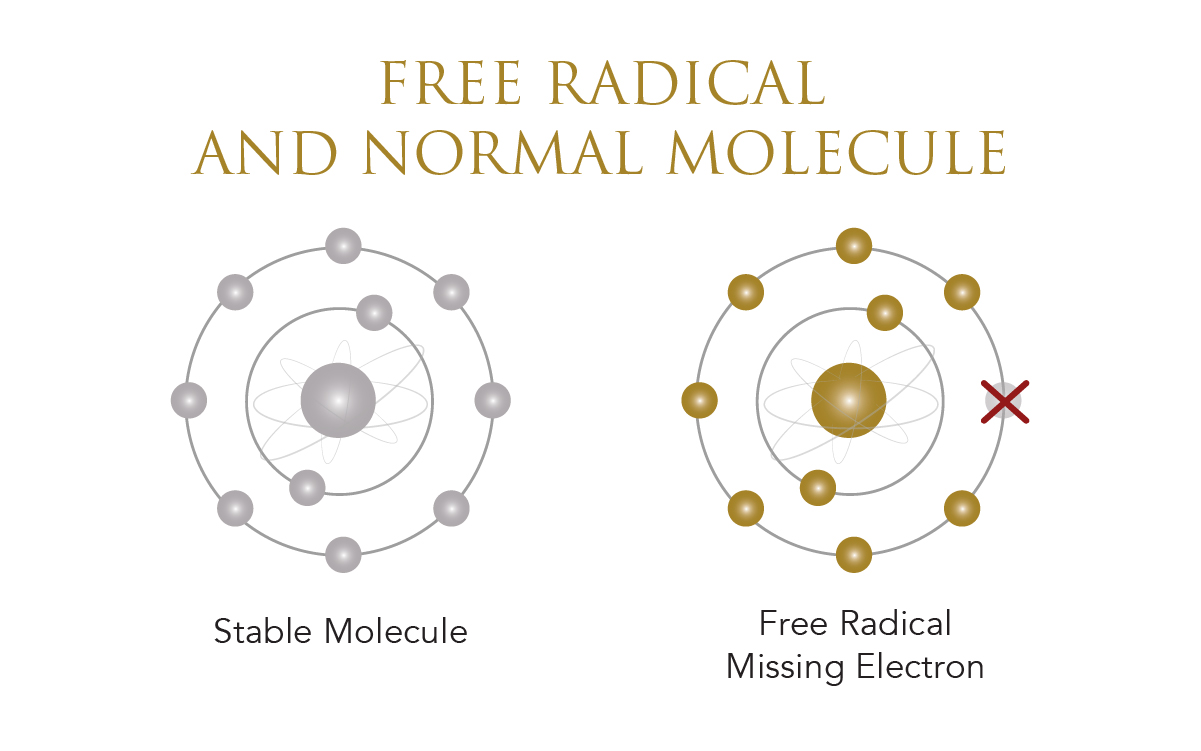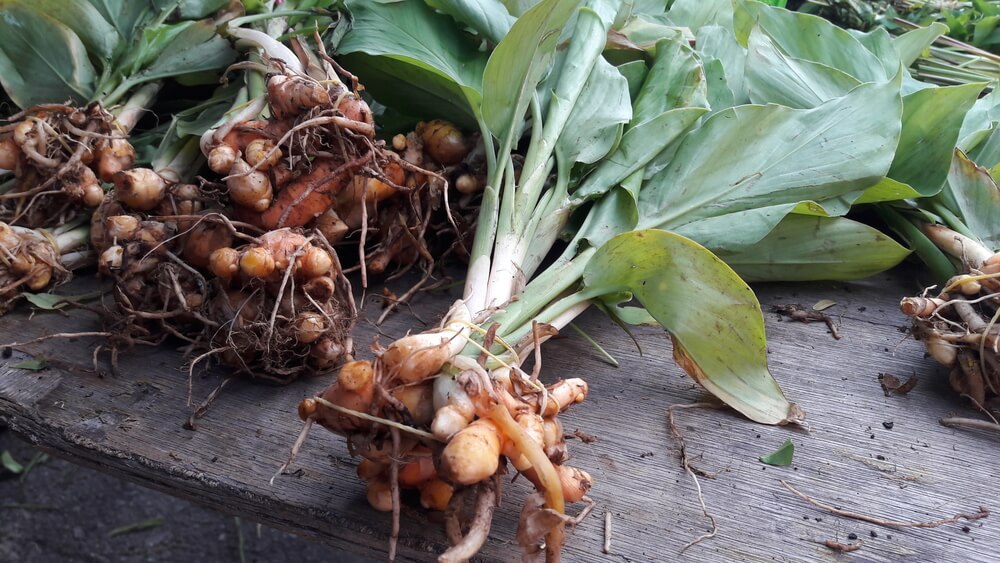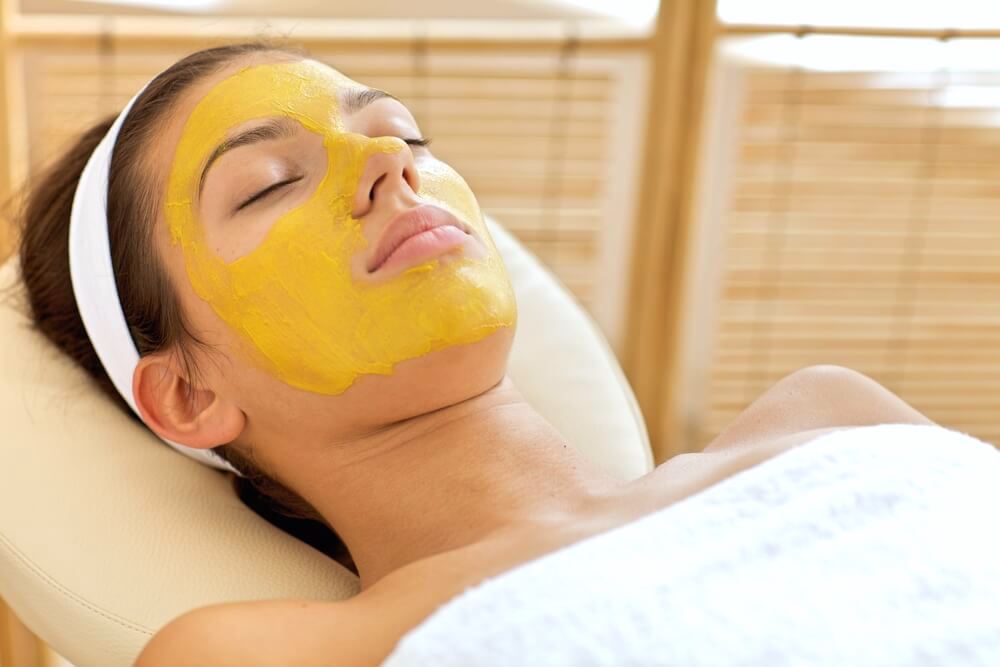All About Turmeric in Skincare

Turmeric is an ingredient that you have likely noticed appearing in more and more skin care products.
Have you ever wondered why this is?
Well, not only is this superfood fantastic for your health when consumed, but it also brings some incredible benefits to your skin when used topically.
What is Turmeric?
Turmeric is a plant that belongs to the ginger family and is native to South Asia. It has been used for thousands of years now in India, both for culinary purposes as well as for dyeing.
As the plant’s medicinal properties slowly became more recognized, turmeric became the focus of so much research and is, in fact, one of the most studied herbs out there.
The roots of the turmeric plant are what contain the plant’s medicinal properties, and this is the part of the plant that is used for cooking, as well as for skin care. The root is usually boiled and then dried, before being finely ground into a potent powder.
This powder can then be incorporated into a wide range of skin care products in order for your skin to enjoy the direct benefits of this medicinal plant.
The Skin Benefits of Turmeric
No matter how you choose to use this herb on your skin, there is no denying that turmeric brings with it some incredible skin benefits.
It doesn’t matter what your skin type may be either, as turmeric is so gentle that it can even be used on sensitive skin without causing a reaction.
1) Treats and Prevents Acne Breakouts
If you suffer from acne, then you may be interested to know that turmeric is an ingredient that could really help with this.
How?
In a couple of different ways…
To begin with, turmeric has some powerful anti-inflammatory properties. In fact, this is what makes the herb such a popular medicinal plant, because it is able to significantly lower inflammation within the body when consumed.
These same effects can be experienced by your skin when you apply turmeric topically. Since acne is caused by inflammation within the pores, using the ingredient to reduce inflammation will go a long way in preventing breakouts from occurring.
Those who suffer from acne breakouts also usually have oily skin, and this is something else that turmeric can help to treat.
A study carried out in 2012 showed that turmeric had the potential to noticeably decrease the amount of sebum produced by the skin’s sebaceous glands. In fact, after a turmeric treatment had been applied to the skin for four weeks, the study found that the subjects experienced a 25% decrease in sebum production and facial oil.
How is it able to do this?
It is believed that this effect is down to the phytosterols and fatty acids within the herb. This has been proven, in several other studies, to be able to decrease excess oil in the skin.
If all of that wasn’t enough to help in your fight against acne, turmeric also contains antiseptic properties. This helps to prevent any acne-causing bacteria on the surface of the skin from spreading, once again cutting back on the amount of breakouts you experience.
2) Has Anti-Aging Properties
Do you know what causes the skin to age?
Many people would guess that this is down to genetics, but, in fact, it is largely due to external factors that are under your control.
These external factors, from sun exposure to pollution to stress, result in the formation of free radicals in the body. These free radicals attack various cells within the body, causing damage to their DNA. This damage then leads to problems when it comes to DNA replication, resulting in older and damaged cells and tissues accumulating within the body.
Fortunately, turmeric can help with this in a couple of different ways…
Firstly, turmeric has powerful antioxidant properties. Antioxidants are the best way to fight against the free radicals that lead to skin aging.
Why?
Because free radicals are basically molecules that are missing an electron. The reason why they attack other cells is to “steal” an electron in order to heal themselves.
However, antioxidants contain several extra electrons. When they come into contact with a free radical, they donate one of their spare electrons to the free radical and heal it, therefore preventing it from continuing on with its attack.

Research shows that turmeric is able to help with the following signs of skin aging:
- Fine lines and wrinkles
- Dark spots and other skin pigmentation changes
- Skin texture
- Skin dullness
- Skin elasticity
- Spider veins
3) Protects Against UVB Damage
Many of the aging-related skin issues mentioned above, such as the loss of elasticity and the onset of wrinkles, are actually caused by sun exposure. In fact, many experts believe that up to 90% of facial skin aging is due to exposure to UV rays.
How do UV rays actually damage the skin?
Well, when your skin is exposed to UV radiation, an enzyme called MMP-2 is activated. This is the enzyme that then destroys the collagen that lies between the middle and outer layer of your skin, resulting in skin aging.
Turmeric is able to prevent this enzyme from being activated, meaning that it does not get the chance to cause the damage it otherwise would have.
Of course, this doesn’t mean that turmeric should replace your sunscreen. The sun produces both UVA and UVB rays, and while turmeric may help to prevent UVB damage to a certain extent, a sunscreen each and every day is still absolutely essential.
4) Alleviates Dark Circles and Puffiness
Dark circles and puffiness around the eyes can be extremely frustrating to deal with.
There are several products out there that are designed to help with this, but turmeric is one of the most beneficial.
How is it able to help clear dark circles and puffiness?
Well, as mentioned earlier, turmeric contains anti-inflammatory properties. This helps to reduce the dark shadows, as well as puffiness.
Turmeric also helps to stimulate the circulation. This brightens up the complexion by increasing the amount of oxygen and nutrients that are delivered to skin cells.
5) Speeds Up Healing
Once again, it is turmeric’s anti-inflammatory properties that help it to speed up healing in the skin.
These anti-inflammatory properties not only decrease inflammation in wounds, but also oxidation, meaning that wounds are then able to heal so much quicker.
Of course, the healing properties of turmeric are not just limited to wounds…
When the skin is damaged, the collagen tissues that lie within it are harmed too. Collagen is an important structural protein in your skin, and this is what gives your skin its smoothness and firmness. Turmeric has been found to help increase the rate at which your skin produces collagen, giving you healthier and hardier skin.
6) Prevents Skin Cancer
Skin cancer is becoming increasingly common, with the majority of people dealing with this turning to traditional chemotherapy treatments.
However, while chemotherapy does help to destroy cancer cells, it also causes damage to the healthy and normal cells in the skin.
On the other hand, turmeric has also been shown to be able to kill off cancer cells, but does this while leaving healthy cells completely intact.

Fresh turmeric plant
Wondering why turmeric isn’t being used to treat cancer if it is so effective at this?
Well, it actually is being used. It is known as curcumin extract therapy, and this makes use of the compound called curcumin that turmeric contains. It is able to treat three types of skin cancer, and these are:
- Basal cell carcinoma
- Melanoma
- Squamous cell carcinoma
Not only is turmeric able to cause death in cancer cells, but it also prevents them from forming in the first place, while inhibiting them from spreading if they have already formed.
7) Treats Hyperpigmentation and Acne Scars
As mentioned above, turmeric is great for encouraging the skin to heal, and the same applies when it comes to hyperpigmentation and acne scars too.
Both of these issues are caused by excess melanin in the skin, which is the pigment that gives your skin its color. The extra melanin ends up clustering beneath certain parts of the skin, resulting in those areas taking on a darker appearance.
How does turmeric help with this?
It controls the amount of melanin produced by the skin, preventing over-production. This then helps to lighten up any scars while also evening out the skin tone.
8) Helps to Treat a Variety of Dermatological Conditions
There are plenty of animal studies on turmeric, but human studies have only recently begun to emerge.
Turmeric is now being studied in relation to a number of different skin conditions, such as:
- Eczema
- Psoriasis
- Alopecia
- Lichen planus
- Scabies
Wondering what the results have been like?
Well, many more studies are needed in order for the results to be conclusive, but, so far, the results are showing that turmeric has the potential to help with all of the above.
Not only is turmeric able to prevent flare-ups in symptoms of the above conditions, but it also helps to treat the actual flare-ups and symptoms, ensuring that they do not stick around for too long.
9) Minimizes the Appearance of Stretch Marks
When the skin stretches at a fast rate, due to factors such as weight gain or a growth spurt, this causes the dermis layer of your skin, which is the middle layer, to tear, resulting in stretch marks.
Stretch marks can be so difficult to get rid of, and can sometimes take years to fully fade.
Want to speed up the process?
Try using turmeric on your stretch marks.
The plant’s antioxidant properties help to boost the way in which the skin’s membrane cells function, not only preventing stretch marks from forming but also reducing the appearance of stretch marks that are already there.
However, you will need to use turmeric regularly and consistently on your stretch marks in order for it to make a difference.
How to Use Turmeric Topically
Thanks to its wide variety of skin benefits, turmeric is now being incorporated into such a wide range of skin care products, meaning that you will easily be able to find one to target the specific skin issue you are trying to treat.
Turmeric masks tend to be the most popular type of product.

Why?
Because masks are designed to remain on the skin for an extended period of time, giving its active ingredients the chance to properly penetrate into the skin and work their magic.
For this reason, moisturizers containing turmeric can also be extremely beneficial. While moisturizers tend to treat the outer layers of skin, rather than the deeper ones, this can still have a huge influence on everything from aging to acne to everything else mentioned earlier.
Turmeric toners are also becoming increasingly common. This is primarily due to the brightening properties of turmeric, and a toner is great for delivering these benefits to the skin.
One thing to keep in mind when it comes to using skin care products that contain turmeric…
If there is quite a large concentration of turmeric within a product, it does have the potential to slightly stain the skin a yellow color. This is usually easily removed with some water or a gentle cleanser, but make sure that you don’t get any of the product onto your clothes or furnishings, as these will not clean away quite as quickly!
Don’t forget…
When trying out a new product, even if it is primarily made up of natural ingredients, you should always perform a patch test first to ensure that your skin does not have any negative reactions to any of the ingredients within the product.
There are so many superfoods out there that are great for the skin, but not many of them contain the same level of powerful benefits as turmeric. From being able to prevent and reduce the visible signs of aging, to treating such a wide variety of different skin conditions, turmeric is an ingredient that would benefit just about everyone, no matter what your skin type may be!

